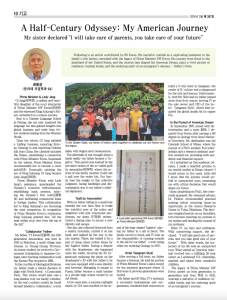Community
A Half-Century Odyssey: My American Journey
My sister declared “I will take care of parents, you take care of your future”
by 권봉성 (문리대 지질학과 64)
Following is an article contributed by BS Kwon. His narrative unfolds as a captivating testament to his family's rich history, entwined with the legacy of Prime Minister DW Kwon. His journey from Seoul to the heartland of the United States, and the choices that shaped his American Dream, paint a vivid picture of resilience, familial bonds, and the enduring spirit of an immigrant's odyssey. - Editor’s Note.
Prime Minister & Lady Jang
OJ Jang(장옥정), a radiant and beautiful daughter of the court interpreter of Prime Minister DW Kwon(권대운) and the esteemed King Sukjong's Palace, embarked on a unique journey. Sent to a Chinese Language School in Peking, she not only mastered the language but also gained insights into global business and trade from fellow students hailing from the Western World.
Upon her return, OJ Jang initiated a trading business, exporting Korean Ginseng to and importing Chinese silk from China. Her clientele included the Palace, establishing a connection with Prime Minister Kwon. Impressed by her talents, Prime Minister Kwon recommended her to become a court lady(궁녀). Eventually catching the eye of King Sukjong, OJ Jang became Lady Jang(장희빈).
Prime Minister Kwon with Lady Jang’s assistance, spearheaded the Dynasty's economic redevelopment, establishing bank systems, minting the Dynasty's first coin(상평통보) and facilitating commercial loans to foreign traders. This collaboration led to King Sukjong's era becoming the most prosperous. In recognition of Prime Minister Kwon's retirement, King Sukjong granted him "All the land within your view from the top of the hill."
‘Collaborator’ Father
My father, YT Kwon(권용택), the 12th generation descendant, was born in 1913 in Mokchon, a small village near Chonan in Chung-Chung Province. An honor student, he received a Government Scholarship to Japanese Colleges, later teaching mathematics until the Korean War erupted in 1950.
In the crucible of ideological divisions, my father made a fateful decision to align with North Korea's Communist Party. This choice would later cast a long shadow over our family's destiny. As the war's embers cooled, he found himself labeled a 'collaborator,' a term laden with stigma and consequences.
The aftermath of war brought about a harsh reality—my father became a 'fugitive.' This period was marked by the pervasive notion of the so-called guilt by association(연좌제), where the actions of one family member could cast a pall over the entire kin. Our family bore the weight of this collective judgment, facing hardships and discrimination due to my father's political alignment.
‘Guilt by Association’
With my father hiding in a small hole beneath the cow barn floor to evade the watchful eyes of the police and neighbors with anti-communist sentiments, my sister JY(정윤) orchestrated a daring plan to secure a new identity and escape.
One day, she collected firewood from a nearby mountain, carried it on her head, and walked all the way to the city market. There, she traded it for a pair of cheap black rubber shoes for her fugitive father. During a dispute with the shopkeeper, she happened upon his wallet, securing his ID. Ingeniously replacing the photo on the shopkeeper's ID with her father's, he was now equipped with a new identity and footwear. Managing to escape to Pusan, father became a math teacher at a private high school owned by an old friend.
A few years later, a surprise midnight attack by CIA men resulted in the arrest of the long-chased 'fugitive,' placing my father in a jail in Seoul. The family moved to Seoul, and JY took on the responsibility of running errands to the jail for our father's well-being while my studying Geology in SNU.
Hotel ‘Gangnam Style’
After serving a full term, my father became a freeman. He sold his portion of Prime Minister Kwon's land, except for the ancestral graveyard where 11 first sons of previous generations were buried.
My father and JH Shin, JY's husband, a successful businessman and congressman, combined their resources to build a 5-star hotel in Gangnam, the center of K-culture and a playground for the rich and famous. Unfortunately, both Mr. Shin and my father passed away from liver cancer, leaving JY as the sole owner and CEO of the hotel 'Gangnam Style', which later inspired the global smash hit by rapper Psy.
In the Pursuit of American Dream
In September 1970, armed with determination and a mere $200, I departed from Korea after earning a BS degree in Geology from Seoul National University. My destination was the Colorado School of Mines, where the pursuit of a Ph.D. awaited. Full scholarships and a research assistant position awaited me, promising both academic and financial support.
As I embarked on this academic odyssey, I made a heartfelt promise to my tearful mother at Kimpo Airport—I would return in five years. Little did I know that the journey would unfold in unexpected ways, presenting me with critical decisions that would shape my future.
Upon completing my Ph.D., the crossroads appeared. My esteemed adviser, Dr. Pickett, recommended practical training before returning home—an opportunity at the Amoco Research Center in Tulsa, Oklahoma. The decision weighed heavily on my shoulders, torn between honoring my promise to my mother and heeding the counsel of my professor.
Enter JY, my hero and confidante. With unwavering support, she declared, "I will take good care of parents, and you take good care of your future." With these words, the trajectory of my life took an unexpected turn. What started as "practical training" evolved into a fulfilling 20-year career, as I embraced U.S. citizenship, married, and raised three wonderful children.
The legacy of Prime Minister DW Kwon carries on from generation to generation and from 한성 to 라성, weaving a narrative of resilience, familial bonds, and the enduring spirit of an immigrant's journey.

